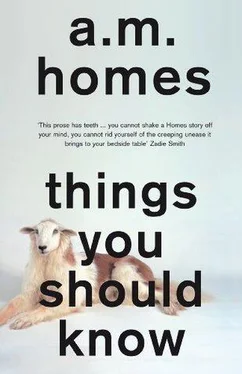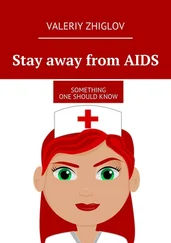“I’m sorry.”
“For what?” she looks at me accusingly.
“Everything.”
“Thirty-eight-year-olds don’t get cancer, they get Lyme disease, maybe they have appendicitis, on rare occasions in some other parts of the world they have Siamese twins, but that’s it.”
In the middle of the night she wakes up, she throws the covers off. “I can’t breathe, I’m burning up. Open the window, I’m hot, I’m so hot.”
“Do you know what’s happening to you?”
“What are you talking about?”
“You’re having hot flashes.”
“I am not,” she says, as though I’ve insulted her. “They don’t start so soon.”
They do.
“Get away from me, get away,” she yells. “Just being near you makes me uncomfortable, it makes my temperature unstable.”
On Monday she starts chemotherapy.
“Will I go bald?” she asks the nurse.
I cannot imagine my wife bald.
“Most women buy a wig before it happens,” the nurse says, plugging her into the magic potion.
One of the other women, her head wrapped in a red turban, leans over and whispers, “My husband says I look like a porno star.” She winks. She has no eyebrows, no eyelashes, nothing.
We shop for a wig. She tries on every style, every shape and color. She looks like a man in drag, like she’s wearing a bad Halloween costume, like it’s all a horrible joke.
“Maybe my hair won’t fall out?” she says.
“It’s okay,” the woman in the wig shop says. “Insurance covers it. Ask your doctor to write a prescription for a cranial prosthesis.”
“I’m a doctor,” my wife says.
The wig woman looks confused. “It’s okay,” she says, putting another wig on my wife’s head.
She buys a wig. I never see it. She brings it home and immediately puts it in the closet. “It looks like Linda Evans, like someone on Dynasty. I just can’t do it,” she says.
Her scalp begins to tingle. Her hair hurts. “It’s as though someone grabbed my hair and is pulling as hard as they can.”
“It’s getting ready to go,” I say. “It’s like a time bomb. It ticks and then it blows.”
“What are you, a doctor? Suddenly you know everything about cancer, about menopause, about everything?”
In the morning her hair is falling out. It is all over the pillow, all over the shower floor.
“Your hair’s not really falling out,” Enid says when we meet them for dinner. Enid reaches and touches her hair, sweeps her hand through it, as if to be comforting. She ends up with a handful of hair; she has pulled my wife’s hair out. She tries to put it back, she furiously pats it back in place.
“Forget that I was worried about them shaving my pubic hair, how ’bout it all just went down the drain.”
She looks like a rat, like something that’s been chewed on and spit out, like something that someone tried to electrocute and failed. In four days she is eighty percent bald.
She stands before me naked. “Document me.”
I take pictures. I take the film to one of those special stores that has a sign in the window — we don’t censor.
I give her a baseball cap to wear to work. Every day she goes to work, she will not miss a day, no matter what.
I, on the other hand, can’t work. Since this happened, my work has been nonexistent. I spend my day as the holder of the feelings, the keeper of sensation.
“It’s not my fault,” she says. “What the hell do you do all day while I’m at the hospital?”
Recuperate.
She wears the baseball cap for a week and then takes a razor, shaves the few scraggly hairs that remain, and goes to work bald, without a hat, without a wig — starkers.
There’s something both admirable and aggressive about her baldness, as if she’s saying to everyone — I have cancer and you have to deal with it.
“How do you feel?” I ask at night when she comes home from the hospital.
“I feel nothing.”
“How can you feel nothing?”
“I am made of steel and wood,” she says happily.
As we’re falling asleep she tells me a story. “It’s true, it happened as I was walking to the hospital. I accidentally bumped into someone on the sidewalk. Excuse me, I said and continued on. He ran after me, ‘Excuse me, boy. Excuse me, boy. You knocked my comb out of my hand and I want you to go back and pick it up.’ I turned around — we bumped into each other, I said excuse me, and that will have to suffice. ‘You knocked it out of my hand on purpose, white boy.’ I said, I am not a boy. ‘Then what are you — Cancer Man? Or are you just a bitch? A bald fucking bitch.’ I wheeled around and chased him. You fucking crazy ass, I screamed. You fucking crazy ass. I screamed it about four times. He’s lucky I didn’t fucking kill him,” she says.
I am thinking she’s lost her mind. I’m thinking she’s lucky he didn’t kill her.
She stands up on the bed — naked. She strikes a pose like a body builder. “Cancer Man,” she says, flexing her muscles, creating a new superhero. “Cancer Man!”
Luckily she has good insurance. The bill for the surgery comes — it’s itemized. They charge per part removed. Ovary $7,000, appendix $5,000, the total is $72,000 dollars. “It’s all in a day’s work,” she says.
We are lying in bed. I am lying next to her, reading the paper.
“I want to go to a desert island, alone. I don’t want to come back until this is finished,” she says.
“You are on a desert island, but unfortunately you have taken me with you.”
She looks at me. “It will never be finished — do you know that? I’m not going to have children and I’m going to die.”
“Do you really think you’re going to die?”
“Yes.”
I reach for her.
“Don’t,” she says. “Don’t go looking for trouble.”
“I wasn’t. I was trying to be loving.”
“I don’t feel loving,” she says. “I don’t feel physically bonded to anyone right now, including myself.”
“You’re pushing me away.”
“I’m recovering,” she says.
“It’s been eighteen weeks.”
Her blood counts are low. Every night for five nights, I inject her with Nupagen to increase the white blood cells. She teaches me how to prepare the injection, how to push the needle into the muscle of her leg. Every time I inject her, I apologize.
“For what?” she asks.
“Hurting you.”
“Forget it,” she says, disposing of the needle.
“Could I have a hug?” I ask.
She glares at me. “Why do you persist? Why do you keep asking me for things I can’t do, things I can’t give?”
“A hug?”
“I can’t give you one.”
“Anyone can give a hug. I can get a hug from the doorman.”
“Then do,” she says. “I need to be married to someone who is like a potted plant, someone who needs nothing.”
“Water?”
“Very little, someone who is like a cactus or an orchid.”
“It’s like you’re refusing to be human,” I tell her.
“I have no interest in being human.”
This is information I should be paying attention to. She is telling me something and I’m not listening. I don’t believe what she is saying.
I go to dinner with Eric and Enid alone.
“It’s strange,” they say. “You’d think the cancer would soften her, make her more appreciative. You’d think it would make her stop and think about what she wants to do with the rest of her life. When you ask her, what does she say?” Eric and Enid want to know.
“Nothing. She says she wants nothing, she has no needs or desires. She says she has nothing to give.”
Eric and Enid shake their heads. “What are you going to do?”
I shrug. None of this is new, none of this is just because she has cancer — that’s important to keep in mind, this is exactly the way she always was, only more so.
Читать дальше












